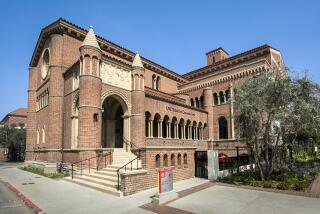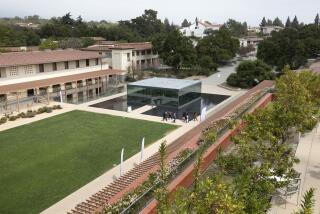Keck Institute in Claremont Gives Students a Free Ride
- Share via
Proud of its financial restraint, Yale announced that its tuition and dorm fees will rise only 2.9% this fall. That means it’ll cost a mere $32,880 per year.
Stanford was more in line with other private schools, raising tuition and fees by 5%. But it trumpeted how an extra $6 million in financial aid will generously help more students cover the yearly $32,471 cost.
Then along comes a little upstart, the newest member of the private Claremont Colleges, with an entirely different strategy in this era of higher education sticker shock.
The Keck Graduate Institute of Applied Life Sciences opened last week, offering a tuition-free graduate school education for every one of the 28 students in its inaugural class.
The free tuition extends to next year too, so the students can complete master’s degrees. Most students also received stipends to cover living expenses.
“I feel lucky,” said Bill Riehl of Atascadero, one of the new master’s students enrolled at the Keck Graduate Institute. He felt relieved too. The two-year master’s program won’t add much to the pile of $75,000 in student loans from his four years at Stanford.
Toronto native Andria Tsang checked around for similar programs in two countries and found nothing close to the tantalizing offer from Keck. “Other schools offer part of your tuition,” she said. “This is a full ride and really, really exciting.”
*
Indeed, the Keck Graduate Institute has joined a short roster of highly selective colleges that cover the expenses of all their students.
New York City’s Cooper Union for the Advancement of Science and Art offers a full-ride scholarship for every admitted student. So does Berea College, a Christian school in Kentucky primarily for low-income students from southern Appalachia. The U.S. military academies provide free education too, but in exchange for a number of years of service in return.
Next fall, the Franklin W. Olin College of Engineering will open in Needham, Mass., and invite as many as 100 freshmen to begin a four-year bachelor’s program--all expenses paid by the earnings from a $300-million grant from the F.W. Olin Foundation of New York.
“One of the aspirations is that we could encourage philanthropy and service, giving things back,” said Olin President Richard K. Miller. “We expect our students to go out and be successful. We wouldn’t be disappointed if they remember us in their will, so the next generation can benefit.”
The Keck Graduate Institute got a similar kick-start in 1997 with a $50-million gift from the W.M. Keck Foundation of Los Angeles.
But the seventh member of the Claremont College Consortium, located about 30 miles east of downtown Los Angeles, differs in that it is limited to grad students pursuing master’s degrees in bioscience.
The idea was to reinvent graduate education to help meet the insatiable appetite in the emerging biotech and biomedical industries. Keck wants professionals who have both business acumen and master’s level scientific skills.
*
So this first class, drawn from students with undergraduate degrees in biology, chemistry, computer science and engineering, will spend the next 22 months in rigorous courses that combine scientific and technical training with management and leadership skills more common among MBA programs.
“This was exactly what I was looking for,” said Nicolas Limthong of New York. He quit medical school a few years ago, after realizing that he preferred pure scientific research and discovery to treating patients.
“I knew I wanted to go into biotech and I wanted a business edge to my education, with industry links,” Limthong said. “That’s exactly what this school offers.”
It was an added bonus when he discovered that the two-year degree would be tuition-free. “Otherwise,” he said, “I was looking at a combined master’s of science and MBA program, which would have cost me $30,000 a year.”
The Keck Graduate Institute hopes to increase the size of its entering class to 60 in coming years and to include a handful of students pursuing doctorates in bioscience.
Students in doctoral programs typically find their graduate educations covered by research grants, teaching stipends and other sources. But it’s fairly rare for master’s candidates to get such extensive financial help.
The Keck Graduate Institute hasn’t decided whether it will provide full scholarships for next year’s class of master’s candidates or those who enroll in subsequent years.
“It has been our plan to provide generous fellowships,” said David J. Galas, the institute’s chief academic officer. “But our trustees decided that the best investment we could make is in a high-quality first class.”
More to Read
Sign up for Essential California
The most important California stories and recommendations in your inbox every morning.
You may occasionally receive promotional content from the Los Angeles Times.













